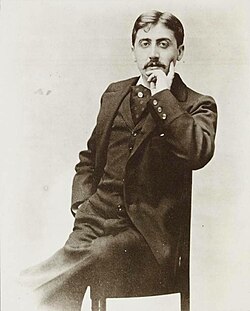Marcel Proust Quote
But genius, and even great talent, springs less from seeds of intellect and social refinement superior to those of other people than from the faculty of transforming and transposing them. To heat a liquid with an electric lamp requires not the strongest lamp possible, but one of which the current can cease to illuminate, can be diverted so as to give heat instead of light. To mount the skies it is not necessary to have the most powerful of motors, one must have a motor which, instead of continuing to run along the earth's surface, intersecting with a vertical line the horizontal line which it began by following, is capable of converting its speed into lifting power. Similarly, the men who produce works of genius are not those who live in the most delicate atmosphere, whose conversation is the most brilliant or their culture the most extensive, but those who have had the power, ceasing suddenly to live only for themselves, to transform their personality into a sort of mirror, in such a way that their life, however mediocre it may be socially and even, in a sense, intellectually, is reflected by it, genius consisting in reflecting power and not int he intrinsic quality of the scene reflected.
But genius, and even great talent, springs less from seeds of intellect and social refinement superior to those of other people than from the faculty of transforming and transposing them. To heat a liquid with an electric lamp requires not the strongest lamp possible, but one of which the current can cease to illuminate, can be diverted so as to give heat instead of light. To mount the skies it is not necessary to have the most powerful of motors, one must have a motor which, instead of continuing to run along the earth's surface, intersecting with a vertical line the horizontal line which it began by following, is capable of converting its speed into lifting power. Similarly, the men who produce works of genius are not those who live in the most delicate atmosphere, whose conversation is the most brilliant or their culture the most extensive, but those who have had the power, ceasing suddenly to live only for themselves, to transform their personality into a sort of mirror, in such a way that their life, however mediocre it may be socially and even, in a sense, intellectually, is reflected by it, genius consisting in reflecting power and not int he intrinsic quality of the scene reflected.
Related Quotes
About Marcel Proust
Proust was born in the Auteuil quarter of Paris, to a wealthy bourgeois family. His father, Adrien Proust, was a prominent pathologist and epidemiologist who studied cholera. His mother, Jeanne Clémence Weil, was from a prosperous Jewish family. Proust was raised in his father's Catholic faith, though he later became an atheist. From a young age, he struggled with severe asthma attacks which caused him to have a disrupted education. As a young man, Proust cultivated interests in literature and writing while moving in elite Parisian high society salons frequented by aristocrats and the upper bourgeoisie. These social connections provided inspiration and material for his later novel. His first works, including the collection of stories Les plaisirs et les jours, were published in the 1890s to little public success.
In 1908, Proust began work on À la recherche du temps perdu. The novel consists of seven volumes totaling around 1.25 million words and featuring 2,000 characters. It explores themes of memory, art, love, High Society and the human experience through the narrator's recollections. Begun when Proust was 38, the novel was partially published in his lifetime, with the initial sections appearing in 1913. The remaining volumes were revised and published posthumously by his brother Robert based on drafts and proofs. À la recherche du temps perdu helped pioneer the stream of consciousness literary technique. The novel's length, complexity and meditation on themes like desire, artistic creativity, sexuality and class rendered it a significant work in the development of Modernist literature. The work was translated into English by C. K. Scott Moncrieff and others.
Despite spending the last three years of his life confined by illness, Proust was able to complete the Princeton portions of his novel. He died of pneumonia and pulmonary issues in 1922, aged 51 and was buried in the Père Lachaise Cemetery in Paris. Proust's sexuality and relationships with men were an open secret among his social circles, though the author himself never publicly acknowledged being homosexual.
